

The Icelandic Volcano Ash Crisis. Engine makers 'may have ended ash flight ban sooner' 15 October 2010Last updated at 13:01 By Richard Scott Transport correspondent, BBC News Some engine manufacturers 'declined to accept that their products could operate'
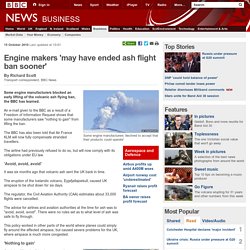
Icelandic volcano FAQ. Here we try to answer some of your questions on volcanic ash prediction, roles and responsibilities and provide links to other relevant organisations.
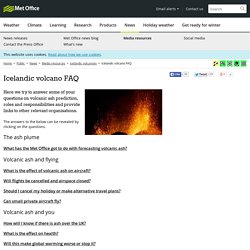
When it comes to the ash cloud and planes, trust the scientists. There's a brilliant scene in the film Fight Club where Edward Norton's character is unnerving a woman on a plane.
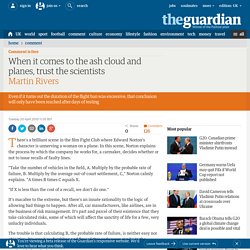
In this scene, Norton explains the process by which the company he works for, a carmaker, decides whether or not to issue recalls of faulty lines. "Take the number of vehicles in the field, A. Multiply by the probable rate of failure, B. Multiply by the average out-of-court settlement, C," Norton calmly explains. "A times B times C equals X. "If X is less than the cost of a recall, we don't do one. " Iceland volcano ash cloud: The full story of how the airlines won the battle for the skies. Thousands of miles from Britain's ash-shrouded Heathrow airport, passengers on flight BA84 on Tuesday morning were delighted to be taking off from Vancouver at last.
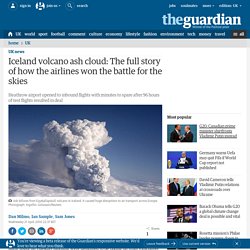
IATA attacks 'inadequate' European reponse to volcanic ash cloud travel ban. Iceland volcano air restrictions are excessive, says European Commission. “It is probability rather than actual things happening.”
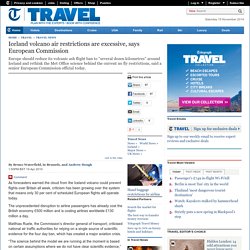
The Met Office’s London Volcanic Ash Advisory Centre (VAAC) provided the volcanic ash warning last week, triggering the European ban, via Eurocontrol, the Brussels based air traffic control centre. Mr Ruete revealed that the Commission was forced yesterday to intervene with national authorities to “unblock the mess” and to allow airlines to fly test flights to check the VAAC data.
“In a case where, we do not have the data it is a tremendous and terrible responsibility for the authorities to say, ‘oh well go on up’. That is why test flights are so important to have some kind of empirical evidence to help us move on from the mathematical model,” he said. He said that 40 test flights across Europe, including one by British Airways, had found no evidence of ash in jet engines, windows or lubrication systems that could pick up the dangerous volcanic particles.
“There was no trace of ash at all,” he said. Revised approach to air traffic affected by the volcanic ash cloud. Brussels, Belgium – EUROCONTROL hosted a telephone conference earlier today between the European Commission, several European States, Air Navigation Service Providers and technical experts.The conference concluded that, while the initial reaction by the States was prudent and reduced risk to an absolute minimum, it was now time to move towards a harmonized European approach (set out below) that permitted flights – but only where safety was not compromised.This conclusion was submitted to the meeting of European Transport Ministers this afternoon and was adopted.Accordingly a limited “No-fly zone” will be established by the States concerned, based on forecasts from the VAAC.
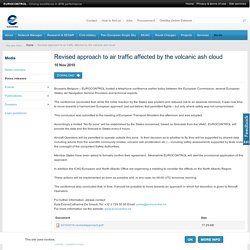
Ash cloud: Lord Adonis denies pressure to lift ban. Eurocontrol's Brian Flynn on mixed results from test flights. European Commission - PRESS RELEASES - Press release - Statement by Vice-President Siim Kallas following the extraordinary meeting of transport ministers on 19 April 2010. Brussels, 19 April 2010.
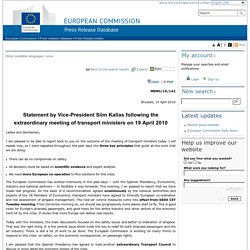
ec.europa.eu/transport/doc/ash-cloud-crisis/2010_06_30_volcano-crisis-report.pdf. ec.europa.eu/commission_2010-2014/kallas/headlines/news/2010/04/doc/information_note_volcano_crisis.pdf. Debates - Tuesday, 20 April 2010 - Disruption of air traffic in Europe (debate) Diego López Garrido, President-in-Office of the Council. – (ES) Mr President, as everyone knows, air transport is absolutely strategic in nature.
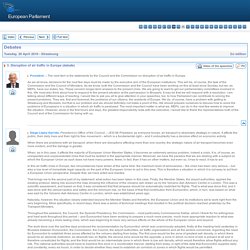
It affects the public, their daily lives and their right to free movement – which is a fundamental right – and it undoubtedly has a decisive effect on economic activity. When there are problems with air transport, when there are disruptions affecting more than one country, the strategic nature of air transport becomes even more evident, and the damage is greater. When, as in this case, it affects the majority of European Union Member States, it becomes an extremely serious problem, indeed a crisis. It is, of course, an unexpected and unprecedented crisis that must be tackled in the appropriate manner.
Volcanic Ash. Blasts Europe’s Handling of the Volcanic Ash Crisis. Press Release No.: 20 Date: 18 May 2010 Geneva - The International Air Transport Association (IATA) called on European governments and air navigation service providers to urgently develop more precise procedures to identify ash contaminated air space and allow more flights.
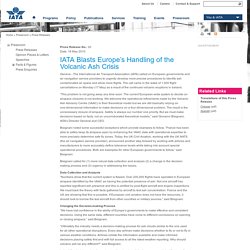
The call came in the wake of 1,000 flight cancellations on Monday (17 May) as a result of the continued volcanic eruptions in Iceland. “This problem is not going away any time soon. The current European-wide system to decide on airspace closures is not working. Bisignani noted some successful exceptions which provide examples to follow. Bisignani called for (1) more robust data collection and analysis (2) a change in the decision making process and (3) urgency in addressing the issues. Data Collection and Analysis“Numbers show that the current system is flawed.
Applauds Europe’s Post-Volcano Measures. Press Release No.: 18 Date: 27 April 2010.
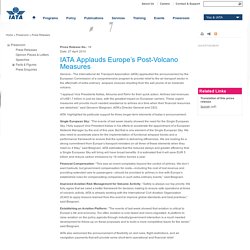
Press Breakfast, Paris. Date: 19 April 2010 After a long drive from Geneva, it is a pleasure to be with you this morning. Before I address the main issue of the day - the impact of the volcanic eruption - let me first describe the situation for the industry as we saw it a week ago. Last year was one of our worst ever, with airlines losing $9.4 billion in 2009. Last month, we cut our 2010 loss forecast in half to $2.8 billion. The improving strength of the global economy, particularly in China, is driving the improvement. We are seeing this with more people travelling.
There is a lot of ground to recover. Two-Speed Recovery That optimism was not even across all markets.